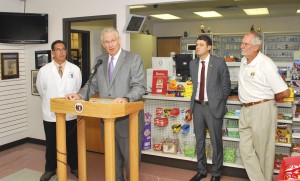Northeast News
August 14, 2013

Governor Jay Nixon visited Historic Northeast Aug. 13 to discuss his veto of House Bill 253, which would have eliminated the current sales tax exemption on prescription drugs and resulted in an estimated tax increase of $200 million annually.
While at Spalitto’s Pharmacy, Nixon stressed that eliminating the exemption would make it increasingly difficult for families to afford needed medications.
“House Bill 253 is a $200 million a year tax hike on prescription medication that will hit vulnerable Missourians the hardest,” Gov. Nixon said. “Many of the lawmakers who voted for this bill must not have had the opportunity to read or fully understand all its negative consequences. But now that the House Bill 253 tax hike has been discovered, there is no excuse for voting a second time to raise taxes on Missouri families and seniors by $200 million a year.”
Pete Spalitto, pharmacist and owner of Spalitto’s Pharmacy, said if House Bill 253 passed, it would affect a number of his Northeast customers.
“We are a family business that has been serving this community for three generations,” Spalitto,said. “Raising taxes on prescription medicine is going to make it harder for our customers to stay healthy and more difficult for seniors to make ends meet. The folks who walk through our doors, especially the older folks, can’t afford a tax increase. This tax hike needs to be stopped.”
Since 1979, Missouri law has exempted prescription drug costs and co-pays from state sales tax. Language in Section 144.030 of House Bill 253 would repeal this exemption, resulting in an estimated $200 million tax increase on Missourians who take prescription medication. Because local jurisdictions follow state laws regarding exemptions, House Bill 253 would make prescription drugs subject to local sales taxes as well, resulting in a new tax of up to 10 percent in some communities.
Nixon vetoed House Bill 253 earlier this summer, but some members of the Missouri General Assembly have expressed their intent to override the veto at the annual veto session this September.
Last month, AARP Missouri applauded Gov. Nixon’s veto of House Bill 253 and urged the legislature to sustain it.
“Preventing the taxation of prescription drugs, as instituted by this bill, is critical to AARP Missouri’s 750,000 members,” said AARP Advocacy Director Norma Collins. “This tax increase would be endured disproportionately by seniors, many suffering from cancer, heart disease and other life-threatening illnesses. Prescription drugs costs can exceed thousands of dollars per month-adding taxes to that number is especially burdensome for those living on fixed incomes.”
In a September 2011 report, the State Auditor recognized that Missouri has the seventh lowest state taxes as a percentage of personal income. In 2012, the Federation of Tax Administrators ranked Missouri the fifth-lowest in per capita state taxes in the country, representing a lower tax burden than all of our surrounding states. Moreover, a 2012 report by Ernst & Young and the Council on State Taxation ranked Missouri’s effective business tax rate as the eighth-lowest in the country.
“Over the past five years, I’ve advocated for and signed targeted tax cuts that have helped to create jobs and grow the economy. As a result, Missouri has been recognized time and time again as a low-tax state. I intend to keep it that way,” Nixon said. “But House Bill 253 is a tax increase that folks don’t deserve and can’t afford. I strongly urge the General Assembly to think twice about voting again to raise taxes on seniors and families.”















